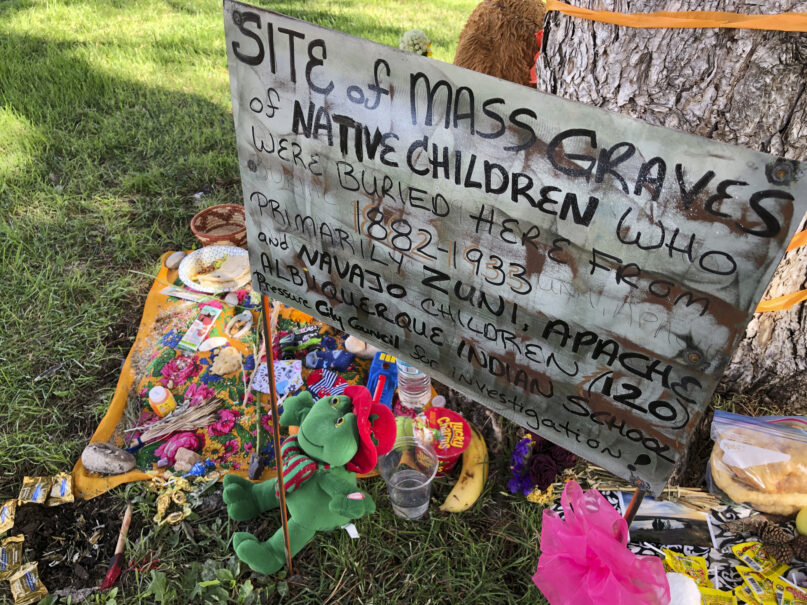(RNS) — Growing up, I learned a certain version of our country’s history. At my Catholic school in the Midwest, I was taught that we were the birthplace of democracy, that we won wars against evil empires and that we were respected as the richest and most powerful country in the world.
As a young adult, I began to understand the limitations, omissions and, sometimes, falsifications of the narratives that had shaped my formal education. At that time, I discovered the Religious Society of Friends (Quakers) and became involved with peace and justice organizations. I was proud to call myself a Friend and hear people affirm the important role Quakers played in U.S. history, maintaining peaceful relations with Native Americans, advancing women’s rights and working to end slavery.
Quakers also believe in seeking the truth.
One such truth I had not previously been taught was that Quakers were among the many Christian churches that collaborated with the U.S. government from the 1800s through the 1960s to operate hundreds of boarding schools for Native children. With such cruel and abusive tactics as hair cutting, prohibition on speaking Native languages and forcible separation of children from their families, the purpose of these institutions was clear: to force assimilation into the predominant white culture.
Thanks to the testimonies of survivors and an extensive recent investigation by the Department of the Interior, we now know that thousands of children died at these schools and many more suffered physical, sexual and emotional abuse. Harmful policy decisions were made and faith communities, including my own, helped drive them, immeasurably devastating Native children, families and cultures for generations to come.
Given our communities’ complicity in committing harm, we and Congress share the burden of helping to shed light on the magnitude of what occurred. We now have a vehicle by which to do so.

A makeshift memorial for the dozens of Indigenous children who died more than a century ago while attending a boarding school that was once located nearby is displayed under a tree at a public park in Albuquerque, New Mexico, on July 1, 2021. (AP Photo/Susan Montoya Bryan, File)
Bipartisan legislation to create a Truth and Healing Commission on Indian Boarding Schools (S. 761) is moving through Congress and warrants our support. While establishing a Truth and Healing Commission would not change the past, it would investigate and document the history of these schools, take testimony from survivors and make recommendations to Congress for future action.
The National Native American Boarding School Healing Coalition and other Native groups have led persistent and dedicated advocacy to advance this bill, and faith groups like mine have had the honor to work alongside them. Last month, my organization, the Friends Committee on National Legislation, joined with NABS to lobby Congress in support of the bill. In these meetings we heard directly from survivors and descendants about the impact that these schools had. One thing that became clear was that the damage was widespread. Every Native family has a story about these schools.
FCNL hosted a webinar several years ago with Quaker sociologist, writer and human rights activist Paula Palmer. She talked about a Quaker teacher at one of the boarding schools who wrote in her journal, “We could make so much progress with these children if they would just stop running away.” This line has stayed with me. The teacher could not see past her own intentions why the children kept running away: These schools were causing immense harm.
This truth requires telling. It is time for Congress, faith communities and all Americans to stand with Native people in their pursuit of federal accountability.
In an era marked by extreme polarization, I cannot overemphasize that this is not a partisan issue. The bill is widely supported by both Democrats and Republicans — and we are seeing momentum build. A faith group letter that FCNL organized earlier this year received a record number of signers calling on Congress to pass the bill. This advocacy is working.
On July 31, the Truth and Healing Commission on Indian Boarding Schools Act was reported out of the Senate Committee on Indian Affairs, giving the full Senate the chance to act on it this fall. Tuesday (Sept. 30) marked Orange Shirt Day, the National Day of Remembrance for Boarding School Victims and Survivors. Members of the FCNL community joined others around the country in wearing orange to honor victims and survivors and to urge the Senate to pass the bill as soon as possible.
The gift of learning about uncomfortable parts of our history is that we have the opportunity to work for a better future. The question is, will we take it, or will we refuse to face hard truths about our past for fear of challenging the prevailing narrative? The latter can no longer be acceptable to any of us.
With our country’s history at risk of being erased or distorted, people of faith must speak out and demand transparency about the Indian Boarding School System. Any discomfort we might experience in learning about this dark part of American history feels insignificant next to the generational trauma thrust upon those who lived it. Keeping these stories hidden only discredits that pain, therefore perpetuating it. Our healing as individuals, communities and a country can only begin when the whole of our American history is told, and it is incumbent on us and our members of Congress to make that happen.
(Bridget Moix is the general secretary of the Friends Committee on National Legislation and leads two other Quaker organizations, Friends Place on Capitol Hill and the FCNL Education Fund. The views expressed in this commentary do not necessarily reflect those of Religion News Service.)



